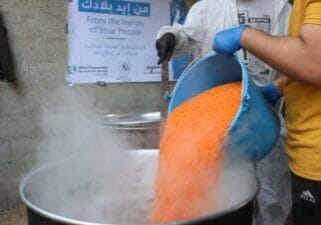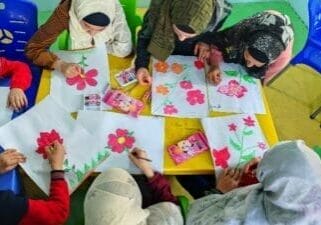News > Blog
Adapting and Innovating in a Volatile World: Reflections from the 2024 Fragility Forum
Published 03/28/2024 by Global Communities
By Paula Rudnicka, Sr. Manager for Public Affairs

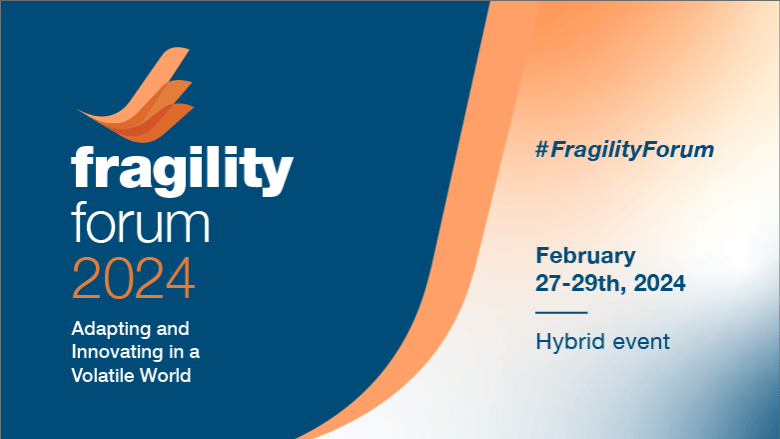
Last month, the World Bank held its 2024 Fragility Forum – a biannual conference that brings together policymakers, researchers and practitioners from humanitarian, development and peacebuilding communities to exchange knowledge and ideas about how to improve our approaches in fragile, conflict and violence-affected settings. This year’s theme was “Adapting and Innovating in a Volatile World.”
After the Forum, I asked my Global Communities’ colleagues who attended the event for their reflections. Kelly Van Husen, Vice President for Humanitarian Assistance; Patricia Dorsher, Senior Manager for Humanitarian Business Development; Meena Grigat, Director of Humanitarian and Nexus Business Development; and Patrick Woodruff, Manager for Humanitarian Assistance participated in the exchange. The conversation was edited for length and clarity.

Paula: In most of the sessions I attended, the panelists painted a bleak picture. The world is increasingly fragile, marred with compounded crises and intertwined risks, from protracted conflicts and climate disasters to chronic political instability and widespread food insecurity. The World Bank estimates that by 2030, almost 60% of the world’s poor will live in countries classified as fragile and conflict-affected situations (FCS). During the opening session, Anna Bjerde, Managing Director of Operations at the World Bank noted that we cannot end poverty without addressing fragility. She also said, “I’m going to be very honest with you. … We are not preventing conflict.” Why? What are the key factors behind these alarming trends?
 Patricia: I have been working on our humanitarian assistance portfolio for the past few years and found it difficult to identify funders who are willing to address the root causes of conflict in contexts like Syria, where the outcomes are very political. For example, investing in infrastructure in the non-regime areas could help stabilize the lives for millions of people, but humanitarian donors do not see this as their purview and development actors do not want to pay for something where there is no recognized government counterpart to work with. We have been working to find intermediate solutions, but with funds decreasing, humanitarian donors want to focus on the urgent, lifesaving activities and not those that can help counter systemic fragility.
Patricia: I have been working on our humanitarian assistance portfolio for the past few years and found it difficult to identify funders who are willing to address the root causes of conflict in contexts like Syria, where the outcomes are very political. For example, investing in infrastructure in the non-regime areas could help stabilize the lives for millions of people, but humanitarian donors do not see this as their purview and development actors do not want to pay for something where there is no recognized government counterpart to work with. We have been working to find intermediate solutions, but with funds decreasing, humanitarian donors want to focus on the urgent, lifesaving activities and not those that can help counter systemic fragility.
 Patrick: Well said, Patricia. Humanitarian and development organizations are often forced to choose between working with actors considered illegitimate by the international community and restricting or even halting programming to at-risk populations. This was evident after the Taliban’s takeover in Afghanistan. The disengagement of many actors, including donors, not only left many people at increased risk, but resulted in brain drain of trained humanitarian workers who fled the country or went underground. The lack of funding and support for national non-governmental organizations has led to devastating backtracking on hard-won gains in the rights of women and minority groups. We can see this trend in almost every major crisis today, from Ukraine and Syria to Gaza and the West Bank. Furthermore, many, if not most humanitarian and development organizations are overly reliant on government funding from the Global North. It makes it increasingly difficult to respond to the needs on the ground when the donor countries are aligned with one side of a conflict. While this is understandable from a political standpoint, porous funding streams leave hundreds of thousands, if not millions of people without lifesaving aid, in direct contradiction to the humanitarian principles.
Patrick: Well said, Patricia. Humanitarian and development organizations are often forced to choose between working with actors considered illegitimate by the international community and restricting or even halting programming to at-risk populations. This was evident after the Taliban’s takeover in Afghanistan. The disengagement of many actors, including donors, not only left many people at increased risk, but resulted in brain drain of trained humanitarian workers who fled the country or went underground. The lack of funding and support for national non-governmental organizations has led to devastating backtracking on hard-won gains in the rights of women and minority groups. We can see this trend in almost every major crisis today, from Ukraine and Syria to Gaza and the West Bank. Furthermore, many, if not most humanitarian and development organizations are overly reliant on government funding from the Global North. It makes it increasingly difficult to respond to the needs on the ground when the donor countries are aligned with one side of a conflict. While this is understandable from a political standpoint, porous funding streams leave hundreds of thousands, if not millions of people without lifesaving aid, in direct contradiction to the humanitarian principles.
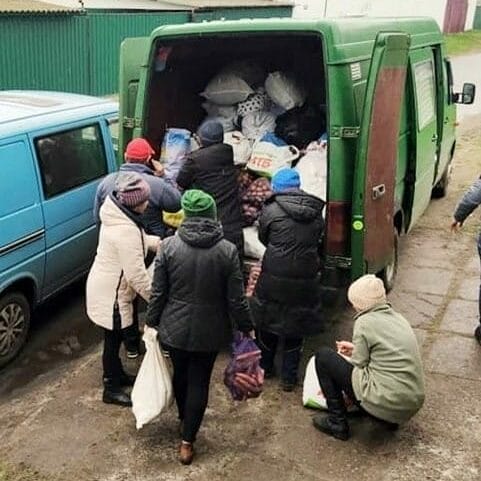
 Patricia: So true! During the session on “State Building in Protracted Crises,” I was struck by the discussion on Palestine led by Nigel Roberts, former Country Director for Gaza and the West Bank at the World Bank. Roberts talked about how the World Bank is designed to be apolitical – at least at a technocratic level – but is beholden to a board that is, by nature, political. Because of this dichotomy, the World Bank has missed many opportunities to help realize economic improvements and development objectives for Palestinians. This resonated with me. In humanitarian assistance, we frequently grapple with the mandate to be “neutral” and “apolitical,” and yet our largest government donors are responsible for carrying out domestic and foreign policies. Being neutral or apolitical is often thought of as the refusal to choose sides, but we fail to recognize that this is also a choice with consequences. It raises the question of what it means to be neutral or apolitical, and if it is ever truly possible.
Patricia: So true! During the session on “State Building in Protracted Crises,” I was struck by the discussion on Palestine led by Nigel Roberts, former Country Director for Gaza and the West Bank at the World Bank. Roberts talked about how the World Bank is designed to be apolitical – at least at a technocratic level – but is beholden to a board that is, by nature, political. Because of this dichotomy, the World Bank has missed many opportunities to help realize economic improvements and development objectives for Palestinians. This resonated with me. In humanitarian assistance, we frequently grapple with the mandate to be “neutral” and “apolitical,” and yet our largest government donors are responsible for carrying out domestic and foreign policies. Being neutral or apolitical is often thought of as the refusal to choose sides, but we fail to recognize that this is also a choice with consequences. It raises the question of what it means to be neutral or apolitical, and if it is ever truly possible.

Paula: How can we, and others in the sector, address these challenges?
 Patrick: To me, some of the most impactful discussions at the Fragility Forum were around the need to stay engaged in challenging situations, including by finding ways to work with illegitimate or diplomatically isolated actors. Many panelists emphasized that humanitarian organizations have the moral responsibility to remain engaged in order to alleviate suffering. They also noted that continued engagement decreases the financial and social costs that result from humanitarian and development actors leaving in the face of these challenges. Of course, there is no easy solution to this, and every organization needs to make its own decisions based on acceptable risk levels. I think that the most important thing that organizations can do is to protect the foundations of humanitarian work, which is rooted in the principles of impartiality, neutrality and independence. By reinforcing these ideals, organizations will be better positioned to respond to crises based on needs.
Patrick: To me, some of the most impactful discussions at the Fragility Forum were around the need to stay engaged in challenging situations, including by finding ways to work with illegitimate or diplomatically isolated actors. Many panelists emphasized that humanitarian organizations have the moral responsibility to remain engaged in order to alleviate suffering. They also noted that continued engagement decreases the financial and social costs that result from humanitarian and development actors leaving in the face of these challenges. Of course, there is no easy solution to this, and every organization needs to make its own decisions based on acceptable risk levels. I think that the most important thing that organizations can do is to protect the foundations of humanitarian work, which is rooted in the principles of impartiality, neutrality and independence. By reinforcing these ideals, organizations will be better positioned to respond to crises based on needs.
 Meena: The sessions I listened to reinforced the importance of investing time and resources into developing an in-depth understanding of the local context. It is very important to build long-term relationships with local communities and actors, and to conduct political economy and conflict analyses. We must be ready to work with communities and local systems over the long-term in order to see impact.
Meena: The sessions I listened to reinforced the importance of investing time and resources into developing an in-depth understanding of the local context. It is very important to build long-term relationships with local communities and actors, and to conduct political economy and conflict analyses. We must be ready to work with communities and local systems over the long-term in order to see impact.
 Patricia: I have to echo what Meena said. You can’t ignore the political context and conflict dynamics. Understanding them at the macro, meso, micro and even household levels is essential if we want to work effectively in fragile and conflict-affected areas. I also want to second what Patrick said about staying engaged. When a new crisis emerges, donors and implementers cannot just forget about conflicts that have been going on for years or decades. When Russia invaded Ukraine, there was a sudden reassignment of critical funding and programming to Ukraine and its refugees. Now, the devastating humanitarian crisis in Gaza dominates the headlines. While we must respond to these new crises to the fullest extent possible, we must still remember about people in Yemen, Syria and other fragile states with protracted conflicts and instability. Their voices deserve to be heard, and their needs deserve to be met, too. I am proud of our programming in Syria, where we have been addressing food security, protection, water, sanitation and shelter needs for a decade. I truly hope donors will remain engaged there for years to come.
Patricia: I have to echo what Meena said. You can’t ignore the political context and conflict dynamics. Understanding them at the macro, meso, micro and even household levels is essential if we want to work effectively in fragile and conflict-affected areas. I also want to second what Patrick said about staying engaged. When a new crisis emerges, donors and implementers cannot just forget about conflicts that have been going on for years or decades. When Russia invaded Ukraine, there was a sudden reassignment of critical funding and programming to Ukraine and its refugees. Now, the devastating humanitarian crisis in Gaza dominates the headlines. While we must respond to these new crises to the fullest extent possible, we must still remember about people in Yemen, Syria and other fragile states with protracted conflicts and instability. Their voices deserve to be heard, and their needs deserve to be met, too. I am proud of our programming in Syria, where we have been addressing food security, protection, water, sanitation and shelter needs for a decade. I truly hope donors will remain engaged there for years to come.
 Kelly: One theme that I heard repeatedly in the sessions I attended was around the need to be agile and innovative. This is not necessarily new, but the speakers highlighted how critical it is for implementers – particularly those working in fragile contexts – to be flexible: constantly evaluating, assessing and identifying new opportunities to shift programming to better meet humanitarian needs and more effectively achieve program outcomes. The Forum also reinforced the need for continued advocacy to our donors, policymakers and other stakeholders around flexible funding mechanisms. In a volatile world we live in, funding mechanisms must have built-in opportunities, such as crisis modifiers, to quickly adapt and pivot to rapid emergency response.
Kelly: One theme that I heard repeatedly in the sessions I attended was around the need to be agile and innovative. This is not necessarily new, but the speakers highlighted how critical it is for implementers – particularly those working in fragile contexts – to be flexible: constantly evaluating, assessing and identifying new opportunities to shift programming to better meet humanitarian needs and more effectively achieve program outcomes. The Forum also reinforced the need for continued advocacy to our donors, policymakers and other stakeholders around flexible funding mechanisms. In a volatile world we live in, funding mechanisms must have built-in opportunities, such as crisis modifiers, to quickly adapt and pivot to rapid emergency response.
 Paula: Indeed. The ability to fluidly respond to changing circumstances is a game changer. We have witnessed how crucial this is in many contexts. In Ukraine, for example, our long-term development program – Decentralization Offering Better Results and Efficiency (DOBRE) – was able to quickly mobilize its networks and provide rapid emergency response right at the onset of Russia’s full-scale invasion in 2022. This paved a way for the Community-Led Emergency Action and Response (CLEAR) program, which we launched soon after in two regions overlapping with DOBRE. By layering life-saving humanitarian interventions with development assistance, we can more effectively respond to the crisis, set the stage for post-war recovery and foster lasting resilience to shocks and stresses.
Paula: Indeed. The ability to fluidly respond to changing circumstances is a game changer. We have witnessed how crucial this is in many contexts. In Ukraine, for example, our long-term development program – Decentralization Offering Better Results and Efficiency (DOBRE) – was able to quickly mobilize its networks and provide rapid emergency response right at the onset of Russia’s full-scale invasion in 2022. This paved a way for the Community-Led Emergency Action and Response (CLEAR) program, which we launched soon after in two regions overlapping with DOBRE. By layering life-saving humanitarian interventions with development assistance, we can more effectively respond to the crisis, set the stage for post-war recovery and foster lasting resilience to shocks and stresses.
Ethiopia also comes to mind, where we are implementing the Resilience in Pastoral Areas South (RIPA South) project. In March 2022, amid one of the driest rainy seasons on record, RIPA South activated a Crisis Modifier to address urgent needs of the most vulnerable people affected by the drought. The Crisis Modifier sets aside funds for emergency response measures to save people’s lives, rescue livestock and safeguard economic gains made possible by development activities. We have categorized these interventions into three windows: livestock support, multi-purpose cash assistance and access to water, sanitation and hygiene.
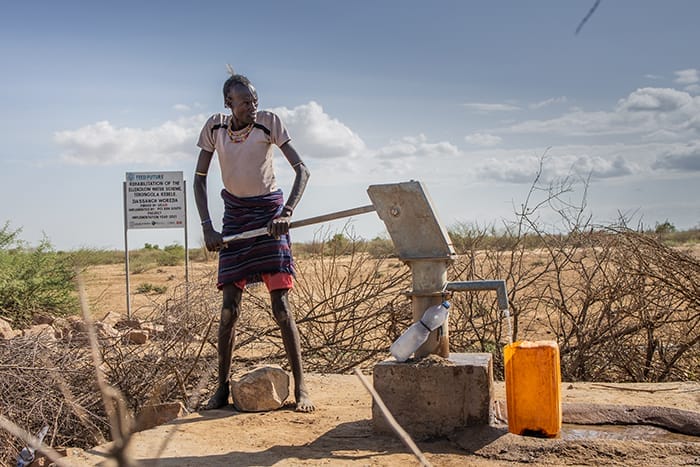

Paula: Where else is Global Communities adapting or innovating in the face of fragility and constant change?
 Kelly: Gaza was mentioned several times during the Forum. Since the start of the Israel-Hamas war on October 7, 2023, we have pivoted more than 20 years of programming to address the urgent needs resulting from this devastating humanitarian crisis. Our teams are managing to adapt and innovate in Gaza, despite extremely constrained and dangerous circumstances. As you know, 2.2 million people are at the imminent risk of famine, and we are proud to serve as the World Food Programme’s (WFP) main implementing partner. We have been able to shift our WFP work from cash to in-kind assistance, and we have pooled resources and knowledge to partner with others, for example the World Central Kitchen, to provide hot meals. We are also distributing nutritional supplements to pregnant women, nursing mothers and small children who are at increased risk of malnutrition. In addition, we are setting up latrines and sinks, and he have provided winterization support to many families. This represents critically needed agility and creativity that has enabled us to continue working in this extremely challenging environment.
Kelly: Gaza was mentioned several times during the Forum. Since the start of the Israel-Hamas war on October 7, 2023, we have pivoted more than 20 years of programming to address the urgent needs resulting from this devastating humanitarian crisis. Our teams are managing to adapt and innovate in Gaza, despite extremely constrained and dangerous circumstances. As you know, 2.2 million people are at the imminent risk of famine, and we are proud to serve as the World Food Programme’s (WFP) main implementing partner. We have been able to shift our WFP work from cash to in-kind assistance, and we have pooled resources and knowledge to partner with others, for example the World Central Kitchen, to provide hot meals. We are also distributing nutritional supplements to pregnant women, nursing mothers and small children who are at increased risk of malnutrition. In addition, we are setting up latrines and sinks, and he have provided winterization support to many families. This represents critically needed agility and creativity that has enabled us to continue working in this extremely challenging environment.

Paula: Agility in adapting to evolving needs is vital in our efforts to ensure efficient, timely support in both stable and crisis conditions. I imagine we have had to adapt and innovate our own internal processes and mechanisms to make it happen.
 Patrick: Yes, absolutely. Global Communities is currently developing Protocols for Emergency Response, so that we are humanitarian-ready even in relatively stable environments. I am personally involved in this effort. We want to ensure that our organization has systems in place to respond to natural disasters and conflicts quickly and effectively. We place a heavy focus on increasing the resilience, preparedness and ability of our country teams to respond with existing programming. This is often done by leveraging our ongoing development programs, like in Gaza, Ukraine or Ethiopia.
Patrick: Yes, absolutely. Global Communities is currently developing Protocols for Emergency Response, so that we are humanitarian-ready even in relatively stable environments. I am personally involved in this effort. We want to ensure that our organization has systems in place to respond to natural disasters and conflicts quickly and effectively. We place a heavy focus on increasing the resilience, preparedness and ability of our country teams to respond with existing programming. This is often done by leveraging our ongoing development programs, like in Gaza, Ukraine or Ethiopia.
 Kelly: We work at the intersection of sustainable development and humanitarian assistance, so strenghtening the capacity of our country teams to pivot from development programming to emergency response is one of our main internal priorities.
Kelly: We work at the intersection of sustainable development and humanitarian assistance, so strenghtening the capacity of our country teams to pivot from development programming to emergency response is one of our main internal priorities.

Paula: Many panelists emphasized how important it is to strengthen local institutions and make them more inclusive in order to solve conflicts and maintain peace. For example, Bjerde said that it is crucial to focus not just on services but also on the institutions behind the services, making sure that their capacity is built. “When things go wrong, when things get difficult and hard, it’s those institutions that need to actually step up even more,” she said. What are your thoughts on this?
 Patrick: I agree. This brings up the topic of localization, which was frequently mentioned at the Forum too. To protect hard fought gains, we must ensure that local and national actors – who do the vast majority of the work on the ground – have the adequate resources and power to adapt their programming in a way that is contextually appropriate.
Patrick: I agree. This brings up the topic of localization, which was frequently mentioned at the Forum too. To protect hard fought gains, we must ensure that local and national actors – who do the vast majority of the work on the ground – have the adequate resources and power to adapt their programming in a way that is contextually appropriate.
 Paula: Right. Ultimately, it is the local communities and institutions who have the intimate understanding of their needs and priorities, and who can design context-specific and culturally relevant interventions. This came up a lot in the session “Gender Equality in FCV Settings: Moving from Humanitarian Responses to Creating Resilience.” Amini Kajunju from the Ellen Johnson Sirleaf Presidential Center for Women and Development spoke very passionately about investing in community-driven solutions, leveraging local expertise and elevating local women leaders. She also stressed that civil society organizations are central to providing services in fragile settings, especially when state institutions are weakened. I know that our sector has a long way to go to fully realize the localization principles, but I think we are making strides. For example, localization is a core strategy of our CLEAR project in Ukraine, where we invest in small, community-based organizations (CBOs), which deliver emergency assistance and protection services to war-affected populations. Of course, this approach has its challenges. When I visited Ukraine last year, many CBO leaders shared their struggles with strict donor compliance requirements. We hear it in other settings, like Syria, too. This is where we come in with our capacity strengthening interventions, which are extremely helpful, but take time.
Paula: Right. Ultimately, it is the local communities and institutions who have the intimate understanding of their needs and priorities, and who can design context-specific and culturally relevant interventions. This came up a lot in the session “Gender Equality in FCV Settings: Moving from Humanitarian Responses to Creating Resilience.” Amini Kajunju from the Ellen Johnson Sirleaf Presidential Center for Women and Development spoke very passionately about investing in community-driven solutions, leveraging local expertise and elevating local women leaders. She also stressed that civil society organizations are central to providing services in fragile settings, especially when state institutions are weakened. I know that our sector has a long way to go to fully realize the localization principles, but I think we are making strides. For example, localization is a core strategy of our CLEAR project in Ukraine, where we invest in small, community-based organizations (CBOs), which deliver emergency assistance and protection services to war-affected populations. Of course, this approach has its challenges. When I visited Ukraine last year, many CBO leaders shared their struggles with strict donor compliance requirements. We hear it in other settings, like Syria, too. This is where we come in with our capacity strengthening interventions, which are extremely helpful, but take time.

Paula: How else did the conference connect with the work you are doing at Global Communities?
 Meena: The session “Troubled Borders: Subnational Conflict in Middle Income Countries” was relevant to the context in northern Ghana, where we have extensive experience implementing water, sanitation and hygiene programs. The region is one of the key focus areas under the U.S. Global Fragility Act. Communities in the districts along the borders of northern Ghana are part of interconnected trade and migration networks, and there are major concerns over the spread of violent extremism into these communities. The speakers stressed the complexity of border economies and governance institutions, and the need to consider market systems, the flow of goods and ideas, the role of the state, and the ability of local actors to arbitrate conflict.
Meena: The session “Troubled Borders: Subnational Conflict in Middle Income Countries” was relevant to the context in northern Ghana, where we have extensive experience implementing water, sanitation and hygiene programs. The region is one of the key focus areas under the U.S. Global Fragility Act. Communities in the districts along the borders of northern Ghana are part of interconnected trade and migration networks, and there are major concerns over the spread of violent extremism into these communities. The speakers stressed the complexity of border economies and governance institutions, and the need to consider market systems, the flow of goods and ideas, the role of the state, and the ability of local actors to arbitrate conflict.
 Paula: Great point. Conflicts and the climate crisis do not recognize borders. Several panelists also emphasized the need to support countries receiving refugees and discussed the global impact of the war in Ukraine. The fragility that has emanated from Russia’s invasion has cascaded globally, affecting countries not just in Ukraine’s vicinity, but states on other continents. For example, the conflict has had a major impact on the global wheat supply, resulting in a widespread food security crisis.
Paula: Great point. Conflicts and the climate crisis do not recognize borders. Several panelists also emphasized the need to support countries receiving refugees and discussed the global impact of the war in Ukraine. The fragility that has emanated from Russia’s invasion has cascaded globally, affecting countries not just in Ukraine’s vicinity, but states on other continents. For example, the conflict has had a major impact on the global wheat supply, resulting in a widespread food security crisis.

Thank you for sharing your reflections. As some of the panelists noted, sustainable development is not possible without sustainable peace, and we need tectonic shifts and holistic approaches to address the interconnected global risks and polycrises. I left the Fragility Forum and our conversation with the following recommendations:
- Anticipate better and be prepared to ensure effective, timely support when conditions change.
- Remain engaged when challenges arise. Ensure stable funding streams. Continuity is vital when fragility grows.
- Acknowledge that conflicts and the climate crisis do not recognize borders.
- Focus on prevention and resilience building. Address the drivers and root causes of fragility.
- Strengthen state institutions, engage the private sector and invest in civil society organizations, including women- and youth-led groups, which are often first responders in fragile settings and play a huge role in recovery efforts.
- Improve governance and the rule of law.
- Ensure that interventions are inclusive and gender-responsive. Talk to people you typically do not engage with.
- Localize development and humanitarian interventions.



